Unpaid work of women: A silent drain on women’s finances

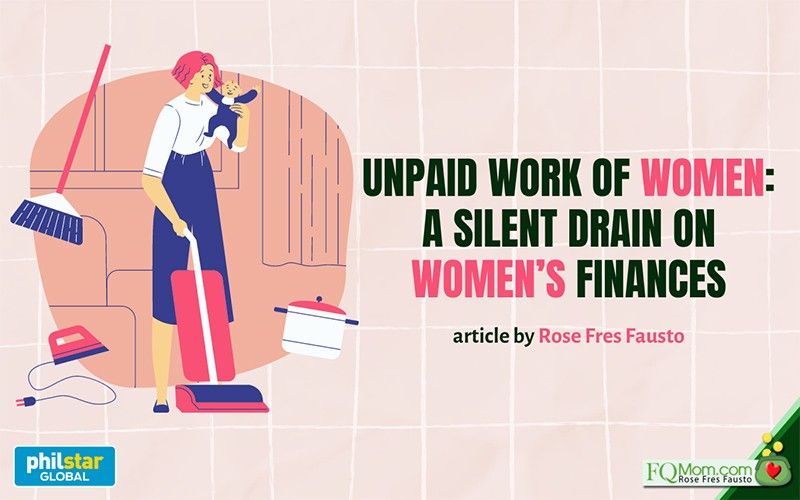
When I decided to say goodbye to my promising investment banking career to give my focused and undivided attention to our young sons, we gave up half of our family income. I am fortunate to be married to someone who never made me feel that his income was just his; otherwise, I wouldn’t have taken this decision to become a single income family back then. It had always been clear to me, to us, that we’re equal partners.
When I first heard about talks on monetizing what a stay-at-home mom did, I was not very keen on it. I would always say, “Why ask to be paid when you co-own everything?” But I was speaking from my privileged perspective. And when I say “privileged,” I don’t mean being very wealthy, but privileged to have that equal partnership with my husband. It is my reality and it was what I saw in my parents during times when my father was the only one earning, when both of them were earning, and when my mom continued earning long after my dad took his early retirement. I would always think that it was a simple matter of the wife standing her ground.
After learning about real stories of women worldwide, I changed my position. It is not a simple case of women standing their ground. It is a society problem that should be solved by the entire society.
In the book "The Moment of Lift (How empowering women changes the world)" by Melinda French Gates, co-founder of Bill and Melinda Gates Foundation, she narrates stories of women she did not just interview but lived with. Yes, she did, in order to have a clearer understanding of the problems their foundation was trying to solve. Her book is a must read for anyone who’s serious about women empowerment. She shares poignant stories of women who do not have knowledge and access to family planning, of unthinkable stories of child brides, of unpaid labor, and other gender biases that are so systemic, it would take generations to solve. I am very happy that at the helm of the largest foundation in the world is Melinda French Gates, a Catholic woman, smart, with a great dose of empathy and humility solving this enormous problem involving half of the world’s population! And she also brings her children with her because she wants her children to have real connection with other people. The guiding principle of their foundation is “Every life has equal value. One life on this planet is no more valuable than the next.”
The story of Champa
One of my favorite chapters in the book is "Chapter 5: The Silent Inequality: Unpaid Work". It opens with a story of Champa, a 22-year-old mother in tribal India living with her husband, three children, and in-laws in a two-room hut. Her two-year old daughter is suffering from acute severe malnutrition, a condition that leads to death if not treated immediately. The health workers explain that she could no longer be fed normal food and required special treatment administered at the Malnutrition Treatment Center. This means that Champa and her sick daughter would be away for about two weeks, and they have to leave soon. And do you know the reaction of her father-in-law, the grandfather of her sick child?
“Champa can’t go! She has to stay and cook for the family!”
The health workers ask to see the father-in-law to explain the situation. They find him lying down in a field drunk, “Your granddaughter will die if she doesn’t get her treatment.” To that the grandfather replies, “Champa can’t go! It’s out of the question, leaving for two weeks. If God takes away one child, he always gives another one. God is very great and generous in this respect.”
My stomach churned and I don’t know what I could have said or done if I were one of the health workers. No one offered to step into this poor woman’s role to cook, not even if it meant the life of her child, their own flesh and blood!

You might be wondering what happened. Did Champa defy her father-in-law? Did the husband fight for his wife and daughter? Did the daughter die of severe acute malnutrition at home?
Here’s what happened. Champa stayed home to cook. (Ugh!) Thank God the child’s life was saved because the health workers intervened, taking the role of the mother.
The sad thing is that this is not an exceptional case. Many women all over the world share this story with Champa. All they do is cook and clean and let their children die in their arms. They are so powerless.
The not so obvious Champas around the world
The injustice of unpaid work also exists in not so obvious places. Unpaid work, defined as work performed at home like childcare, other forms of caregiving, cooking, cleaning, errands done by a family member who is not being paid.
According to the foundation’s data, women around the world spend twice as many hours as men on unpaid work, and the disparity varies across countries. Here’s a partial list.
- India - 6 hours for women vs. less than 1 hour for men
- US - more than 4 hours for women vs. 2.5 for men
- Norway - 3.5 hours for women vs. 3 hours for men
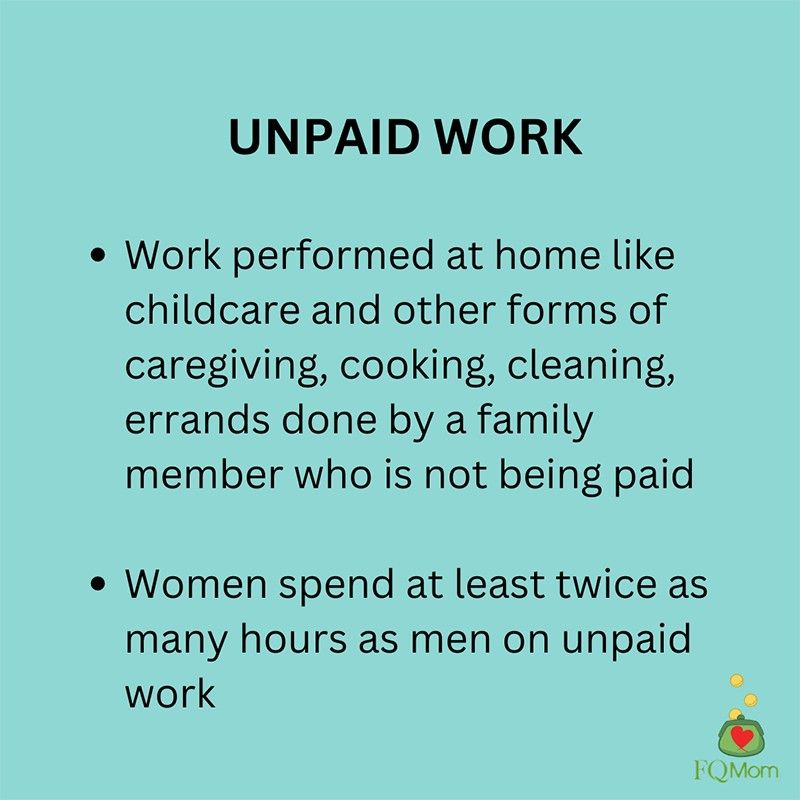
There is no country without a gap. If you compute the average hours, you’ll see that women do seven years more of unpaid work than men over their lifetimes. That’s about the time it takes to complete a bachelor’s and a master’s degree!
The story of this disparity of unpaid work starts not just upon marriage but as early as growing up years when daughters are expected to do more household chores at home while their brothers are given more time to study and play.
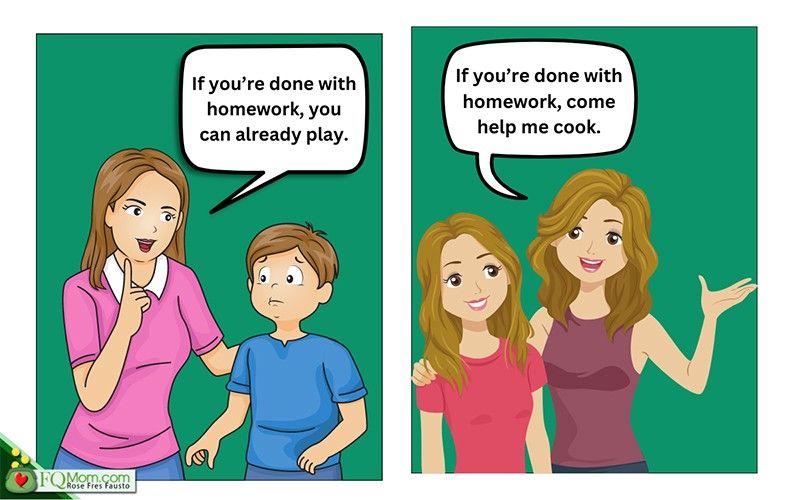
The effect of allowing this lopsided distribution of unpaid work against women that go on in our own society might not have that dramatic effect as Champa’s story, but it remains a dream-killer for women, and unnecessary cause of conflict between spouses and siblings.
For a long time, economists didn’t recognize “women’s work” (housework, childrearing, etc.) in assessing the value of the economy. They just counted the number of hours spent on the farm and other “work place” (of course, work outside the home). Then when women entered the formal workforce, they were still the ones expected to do most, if not all, the unpaid work at home.
Marilyn Waring was the economist and young New Zealand Parliament official who published the book entitled If Women Counted: A New Feminist Economics in 1988. She discussed the issue of unpaid work of women and brought attention to this injustice. The effect: The UN resolution to count women’s unpaid labor whose original implementation date was still many years down the road was moved up to 1995.
Another economist, Diane Elson, came up with a three-part framework to shrink the gap between the time men spend on unpaid work and the time women spend on it. It’s called the 3Rs: Recognize, Reduce, Redistribute
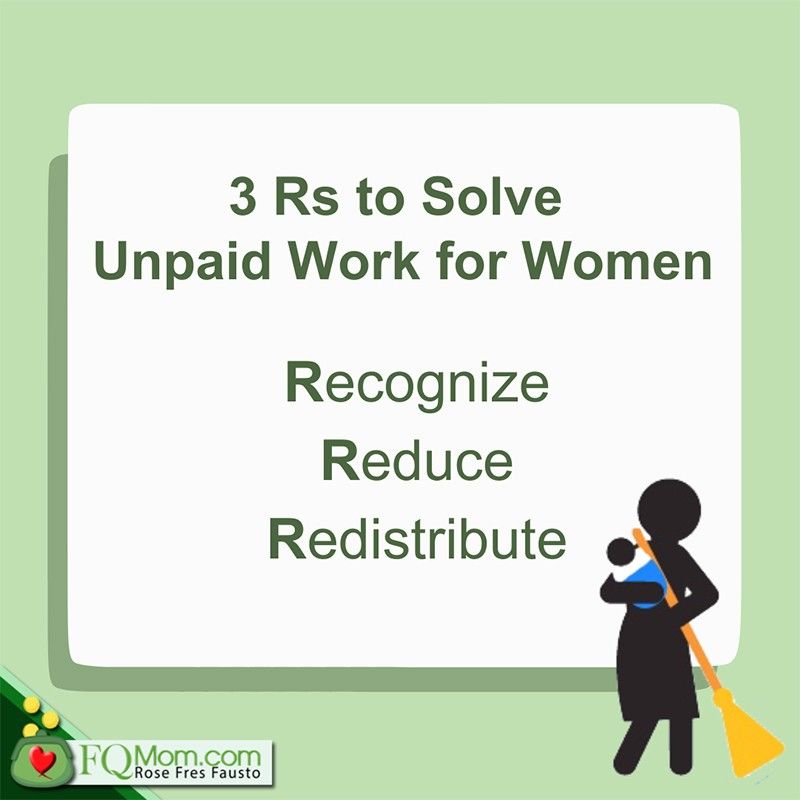
I hope we all start incorporating the 3Rs in order to shrink the gap that exists in our own homes. The gaps between husband and wife in household chores, father and mother on child-rearing, brother and sister in household chores and caring for aging parents, and many more.
In the Filipino setting, this may be an awkward thing to bring up where you are prone to be accused of walang utang na loob, nagbibilangan, and all those other guilt-inducing remarks. But they have to be discussed in the light of the 3Rs which will eventually be for the common good.
The importance of money in women empowerment
All these bring us back to the importance of women being good with money. In the many cases of women abuse, money almost always plays an important role. How many sad stories do we hear of women enduring pain, both physical and emotional, just because of the lack of money?
One of the most memorable lines from Melinda’s book is this: Poverty is the most disempowering force on earth!
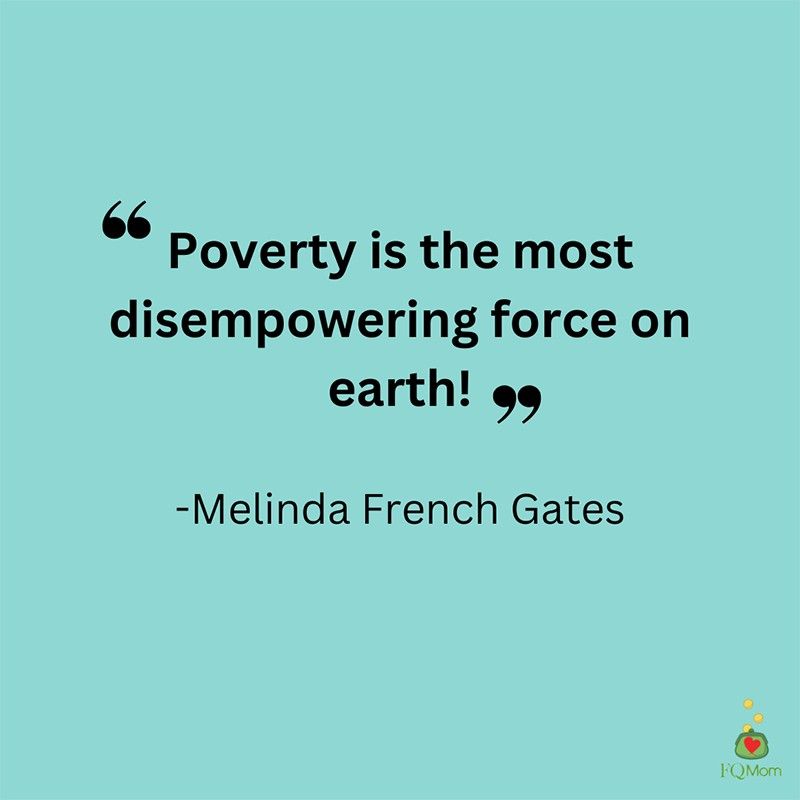
This is the reason why I am excited to teach women and help them have a high FQ! My kids have all grown up and I wish to impart what I’ve learned throughout the years – what worked, what didn’t.
I have lived a life not marred by money issues despite not being born to a rich family. There were money challenges but nothing debilitating to scar me for life. I was just lucky that I was raised by a woman who knew her money values and imparted them to her children. I was lucky to be educated and allowed to pursue my career, as much as my brother was. I was also lucky that I married someone who supported me when I decided to quit my job and never made me feel inferior just because I was no longer an income contributor. I was lucky that I thought of ways to continue treating my family contribution of raising our sons and keeping our home, including keeping a strict accounting of family expenses and investments, real work. That’s true, my sons would ask, “Ma, are you busy with work?” when they saw me doing our family albums or updating family financial statements or doing other chores.
I didn’t need to ask for an accounting for the value of my unpaid work because it was highly recognized and very much appreciated by all family members.
I was secure enough because I was empowered by our equal partnership. I knew exactly how much we had, how much we spent, how much we had to save and invest to achieve our dreams. It was also because I was educated and had the capability to earn.
All of these plus my continuing education in the realm of money and family are what I bring to this important campaign to empower women. I hope you have learned from the books and articles I’ve written, videos we made, workshops and talks that hopefully you’ve attended. Most importantly, I hope that you’ve applied and passed on the lesson to others.
Empowering women is not just empowering 50% of our population. When we empower women, we empower their parenting allowing them to raise good citizens for the country, we empower our corporations that are in dire need of that woman’s touch in board decisions, we empower government institutions that desperately need women representation in order to pass and implement the right laws, especially those involving women.
I’ll say it again, when we empower women, we empower the whole world!
*****
1. As supplement to this article, I invite you to read all my Women’s Month articles including 8 Money Challenges for Women (Attention: Men/Women/Family/Employers/Society) and Gender Gap Pay.
2. Take the FQ test now to start your empowerment journey!
3. I will speak at the SheTalks Asia on March 23, 2023, 3pm at 8th Floor of W Global Center, 30th, Corner 9th Ave, BGC, Taguig.



















